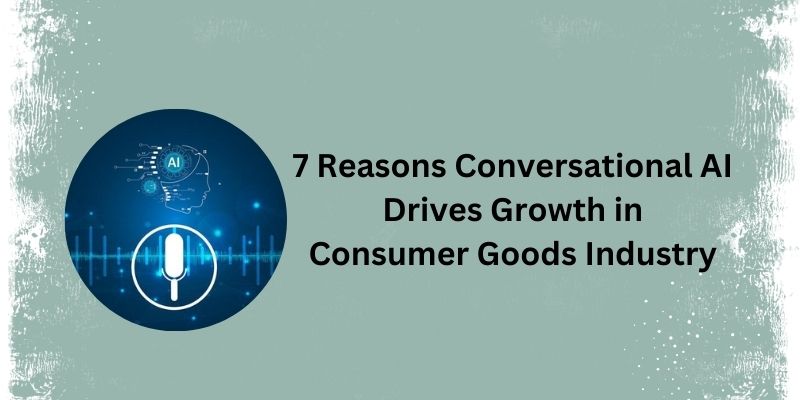As the world progresses, consumer goods businesses must put more effort into their operations. Efficiently running your business and connecting with your customers are the needs of the hour. Recently, consumer goods industries have started to shift to conversational AI for their customer support. It uses artificial intelligence for natural and meaningful conversations between machines and people. Automation in business brings customers trust and loyalty and also boosts sales instantly. There are multiple reasons behind this increase in sales. In this article, we will discuss how the integration of conversational AI can help your consumer goods industry.

Reasons behind rising consumer goods sales
Personalized customer engagement
Conversational AI creates personalized customer engagement. With tools like AI and data analytics, businesses can easily learn about customer preferences, behaviors, and needs. Using this information, businesses can send customers customized messages, product recommendations, and offers that align with each customer's interests. When customers feel that a business understands their unique needs, they are more likely to stay loyal and engage with the brand repeatedly.
Boost sales with targeted recommendations
it is seen that businesses are getting more sales due to AI-powered recommendations. These systems analyze customer data, such as browsing history, past purchases, and preferences, and suggest relevant products. The customer, who was already looking for some choices to buy the product, quickly decides and hits the purchase. They also feel understood when they receive suggestions that match their tastes, which builds trust and loyalty.
- Cart abandonment
Cart abandonment is a common challenge for e-commerce businesses. Customers add items to their online shopping carts but leave before they complete the purchase. This issue often arises due to complicated checkout processes, lack of guidance, or high shipping costs. In this case, conversational AI helps customers and answers their queries in no time. Some businesses even use AI-driven outbound calls to reconnect with customers who left items in their carts. This not only increases sales but also gains customer's trust and loyalty.
Improves marketing campaigns
Marketing campaigns work more effectively when they are aligned with customer choices. Conversational AI analyzes customer data such as preferences and purchase history and then suggests relevant products to customers. For example, AI-powered tools can send customized emails or push notifications at the right time when customers think of buying that product. This not only increases engagement but also increases sales.
Enhances supply chain efficiency
Businesses can easily increase their supply chain efficiency with AI. It manages logistics, inventory, and operations. AI-powered tools can analyze large amounts of data to optimize inventory management, production planning, and delivery scheduling. Moreover, AI helps businesses to see their supply chain more clearly. It spots problems early before they become big issues. This allows companies to make quick decisions, like changing delivery routes or adjusting production to meet customer needs. AI also handles repetitive tasks, such as paperwork and managing suppliers. This saves time and increases efficiency. Hence, With AI, businesses can create a flexible and strong supply chain that quickly adapts to market changes.
Predicts consumer trends with AI
AI analyzes all the data of customers and predicts future trends. With this feature, businesses stay ahead of the others and introduce products that align with customer preferences. AI also enables deeper personalization, which strengthens customer loyalty. AI also understands customer feelings by analyzing reviews and social media posts. This helps businesses to know what customers want before they even ask. This also helps them stand out as industry leaders.

Streamlines customer support
AI is making customer support faster, more efficient, and always available. AI chatbots can quickly answer questions, solve simple problems, and guide customers through complicated steps without needing a human. This reduces waiting times and provides consistent help, which makes customers happy. AI also helps by directing questions to the right person based on their skills and workload. By automating repetitive tasks and supporting support teams, AI increases productivity and ensures customers get high-quality service.
Future of Conversational AI in consumer goods
The future of conversational AI in consumer goods is full of exciting possibilities. Already, different bots are handling multiple tasks like suggesting different products, processing returns, and answering shipping questions. Helping with these tasks lessens the burden of customer support and helps customers find solutions to their problems. Another big opportunity in the industry is combining AI with smart devices. By this, businesses get even more benefits, such as better inventory tracking and more efficient operations overall. These AI advancements will continue growing and help companies stand out as industry leaders.
Conclusion
Incorporating conversational AI in the consumer goods industry is changing how they interact with their customers. It helps businesses by giving personalized experiences, suggesting the right products, and improving sales. It also solves problems like cart abandonment and many more. If we look into the future, conversational AI will continue to grow, and its use in businesses will be of huge benefit. So, it is a smart choice for the consumer goods industry to stay with it and keep up with market changes.
FAQs
- What is Conversational AI, and how does it work?
Conversational AI is a technology that helps chatbots and voice assistants talk like humans. It uses natural language processing (NLP) to understand what customers say, analyze their questions, and give quick and accurate answers.
- Can Conversational AI boost sales of consumer goods?
Yes, conversational AI helps increase sales by suggesting products based on customer preferences. It makes shopping easier and allows customers to buy more by recommending related or better products.
- Is Conversational AI suitable for small businesses in consumer goods?
Yes, conversational AI is affordable and easy to scale, making it great for small businesses. It automates customer support and marketing tasks, saves time, and improves customer satisfaction.
- What is one way AI improves the customer experience?
One way AI improves customer experience is by personalizing interactions. AI looks at customer data, like past purchases and preferences, to provide recommendations and solutions tailored to each person. This helps customers find what they're looking for faster, makes them happier, and builds a stronger connection with the brand.











